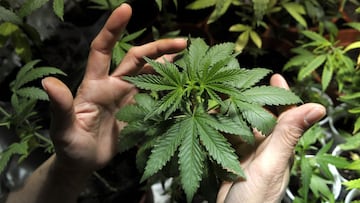Who benefits from President Biden’s marijuana pardon?
President Biden has issued a pardon for all people serving prison sentences for misdemeanor marijuana possession. However, no one will be released from prison...


President Biden has issued a pardon for all citizens and legal permanent residents incarcerated for simple marijuana possession or usage on federal land. The announcement expands on a similar proclamation issued in October 2022 that pardoned those charged with simple possession.
No people are serving a sentence for usage or possession of marijuana in federal possession. There are people at the state level who remain behind bars for these ‘crimes,’ and the White House hopes governors will use their pardon power to allow for their release.
Just as no one should be in a federal prison solely due to the use or possession of marijuana, no one should be in a local jail or state prison for that reason, either. That’s why I continue to urge Governors to do the same with regard to state offenses and applaud those who have since taken action.
President Joe Biden
However, today’s pardon will help those denied public assistance or faced discrimination when finding work because of their conviction. “Criminal records for marijuana use and possession have imposed needless barriers to employment, housing, and educational opportunities, said President Biden while adding that “too many lives have been upended because of [the country’s failed approach to marijuana.”
The White House also announced that eleven people would have their sentences commuted, all of whom “are serving unduly long. Darryl Allen Winkfield, one of the eleven people who the pardon will impact, will have his life sentence commuted on April 20, 2024.
✅@POTUS commuted the sentences of 11 individuals currently serving disproportionately long sentences for non-violent drug offenses
— The White House (@WhiteHouse) December 22, 2023
✅@POTUS issued a Proclamation that pardons additional offenses of simple possession and use of marijuana under federal and D.C. law
How many states have decriminalized or legalized marijuana?
The majority of the US population lives in states where marijuana has been decriminalized or legalized, either for medicinal or recreational use.
| Illegal | Decriminalized | Legal | |
| Legal - Medicinal | Both | ||
|
|
|
|
Related stories
Georgia, Indiana, Iowa, Kentucky, Tennessee, and Texas have legalized CBD oil but no other marijuana products. According to the marijuana legalization group NORML, there were over 24,000 arrests for marijuana possession in Texas in 2022. This figure has dropped from over 60,000 in 2018. In October 2022, there were over 20,000 people serving prison sentences in the Lone Star state for marijuana possession. None of those who were arrested, charged, and convicted on these charges will not be affected by the White House’s pardon.

